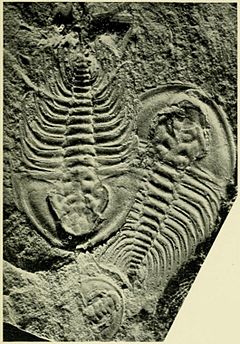Fritzolenellus
| Fritzolenellus Temporal range: late Lower Cambrian (Lower Olenellus-zone)
| |
|---|---|

| |
| Fritzolenellus truemani, North-East base of Mumm Peak above Mural Glacier, Alberta, Canada | |
| Scientific classification | |
| Kingdom: | |
| Phylum: | |
| Class: | |
| Order: | |
| Suborder: | |
| Superfamily: | |
| Family: | "Laudoniidae"
|
| Subfamily: | "Laudoniinae"
|
| Genus: | Fritzolenellus[1] Lieberman, 1998
|
| species | |
Fritzolenellus is an extinct genus from a well-known class of fossil marine arthropods, the trilobites, with three known species.[2] It lived during the early part of the Botomian stage, which lasted from approximately 524 to 518.5 million years ago. This faunal stage was part of the Cambrian Period. Fritzolenellus occurred in parts of the paleocontinent Laurentia in what are now Northwestern Canada, Northwestern Scotland, and North-Greenland.

Taxonomy
Fritzolenellus is the genus closest to the common ancestor of Mummaspis, Laudonia, the Biceratopsinae and the Bristoliinae. This clade is the sister group Wanneria walcottana and of the Holmiidae.
Etymology
The generic name is a combination of the genus Olenellus, to which these species were originally assigned,[4][5] and a reference to William Henry Fritz (1928-2009), a paleontologist who worked on olenelloid trilobites. The species names have the following derivation.
- lapworthi is named in honor of Charles Lapworth, an English geologist who pioneered faunal analysis using index fossils and who defined the Ordovician.
- reticulatus (Latin) refers to the coarsely netted exoskeleton.
Distribution
- F. truemani was collected in the Lower Cambrian (lower Olenellus-zone) of Alberta, Canada (Mural Formation, in the talus slope immediately west of Mumm Peak, from the middle Mural Formation, 125 m above the base of that formation, just north of the Mount Robson Provincial Park boundary). It is also known from North-Greenland (Henson Gletscher Formation).[6]
- F. lapworthi occurs in the Lower Cambrian (lower Olenellus-zone) of Scotland (Allt nan Righrion,[4] Meall a ‘Ghiubhais, Loch Awe),[3] and from the middle Dryeran of Northeastern Greenland (Upper Bastion Formation at Albert Heim Bjerge).[7]
- F. reticulatus is found in the Lower Cambrian (Lower Olenellus-zone) of Scotland (Meall a ‘Ghiubhais,[4] Allt nan Righrion, Loch Awe).[3][2]

References
- ^ a b Lieberman, B.S. (1998). "Cladistic Analysis of the Early Cambrian Olenelloid Trilobites" (PDF). Journal of Paleontology. 72 (1): 59–78. doi:10.1017/S0022336000024021.[permanent dead link]
- ^ a b c d e Lieberman, B.S. (1999). "Systematic Revision of the Olenelloidea (Trilobita, Cambrian)" (PDF). Bulletin of the Peabody Museum of Natural History. 45.
- ^ a b c d Cowie, J.; McNamara, K.J. (1978). "Olenellus (Trilobita) from the Lower Cambrian Strata of North-West Scotland" (PDF). Palaeontology. 21 (3): 615–634.
- ^ a b c Peach, B.N.; Horne, J. (1892), "The Olenellus-zone in the North-West Highlands of Scotland", Quarterly Journal of the Geological Society of London, 48 (1–4): 227–242, doi:10.1144/gsl.jgs.1892.048.01-04.17, S2CID 140197589
- ^ Peach, B.N. (1894). "Additions to the Fauna of the Olenellus-zone of the Northwest Highlands". Quarterly Journal of the Geological Society. 50: 661–676.
- ^ Geyer, G.; Peel, J.S. (2011). "The Henson Gletscher Formation, North-Greenland, and its bearing on the global Cambrian Series 2-Series 3 boundary" (PDF). Bulletin of Geosciences. 86 (3): 465–534. doi:10.3140/bull.geosci.1252.
- ^ Stein, M. (2008). "Fritzolenellus lapworthi (Peache and Horne, 1892) from the lower Cambrian (Cambrian Series 2) Bastion Formation of North-East Greenland" (PDF). Bulletin of the Geological Society of Denmark. 56: 1–10.
